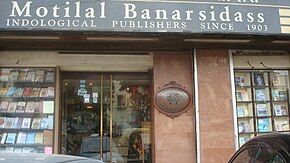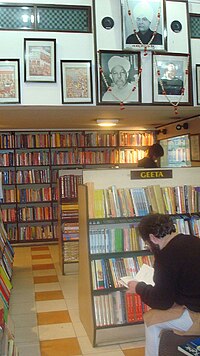History

Motilal Banarsidass Publishers was first established in Lahore in 1903 by Lala Motilal Jain, a descendant of the family of court jewellers to Maharaja Ranjit Singh in Amritsar. Motilal borrowed ₹ 27 from his wife's savings that she had earned from her knitting work, to start a bookshop selling Sanskrit books in 'Said Mitha Bazar' in Lahore. He named it after his eldest son Motilal Banarsidass Jain, who later took charge of the publishing business.

In 1911, MLBD opened a branch at Mai Sewan Bazar, Amritsar, under the supervision of Lala Sundarlal Jain, another son of Lala Motilal Jain, though after the untimely death of Lala Banarasidass in 1912, Sundarlal Jain, his only surviving brother had to close this establishment and relocate to Lahore to look after the family business. Soon he was joined by his young nephew Shantilal Jain, who had just finished school, who eventually became the company's chairman. Soon a printing unit was also set up and the publishing house was established. [5]
In 1937, a branch was started in Patna at the suggestion of Rajendra Prasad. Subsequently, during the Partition of India a riot burnt down the Lahore shop. Post independence, the family moved to India and initially stayed at Bikaner and Patna, before moving to Varanasi in 1950, where it set up shop in 1951, and finally shifted base to Delhi in 1958. Today it is one of the few large publishing houses in the world which has its own in-house printing unit.
In 1992, Shantilal Jain was awarded the Padma Shri by the government of India, the first ever Padma award for outstanding community service through publishing. [3] Today Shantilal's eldest son Narendra Prakash Jain, widely known as 'Prakash' and his four brothers and their sons, along with their mother, Leela Jain, who is the company's Chairperson, run the business. [1] [2]
In 2003, the company celebrated its centenary at a function in Chennai, where Kanchi Sankaracharya, Jayendra Saraswathi, honoured three Sanskrit scholars: R. Balasubramaniam, B.M.K. Sharma and K.V. Sharma. [6] At a function held at Bangalore, Governor of Karnataka, T.N. Chaturvedi, felicitated centenarian Sudhakar Chaturvedi, S.M.S. Chari, and B.K. Krishnamurthy of Hyderabad for their contribution to Indology, and astrologer B.V. Raman was honoured posthumously. [7]